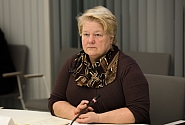
On Thursday, 28 January, during the annual foreign policy debate, Vita Anda Tērauda, Chair of the European Affairs Committee, urged Latvia to protect democracy as it participates in shaping the EU foreign policy, referencing the alarming developments in Belarus and Russia.
“The people of Belarus and Russia, Europe’s neighbours, demand that their governments adhere to human rights and the fundamental democratic right to a free and fair election. But even in a situation like this, when human rights violations were obvious, it was not easy for Europe to agree on taking joint action. Since December, the European Union has a new tool to fight against human rights violations worldwide – its very own Magnitsky Act, which allows imposing individual sanctions on those responsible for human rights violations. The situation in Russia, where the democratic opposition leader Aleksei Navalny faces revenge, surely calls for swift utilisation of the tool,” emphasised Tērauda.
The Chair of the European Affairs Committee highlighted the practical challenges engendered by the pandemic. Now, digitalisation has become increasingly important, and Latvia must use this opportunity to develop a digital environment that supports democracy, said Tērauda. “The digital space goes beyond physical borders, therefore we must look for regional or global solutions. Latvia has the opportunity to take active part in developing a digital democracy framework by exploring solutions that tackle disinformation while protecting the freedom of speech and expression,” said Tērauda.
“Last year, the rapid spread of the virus resulted in immediate, albeit individual responses of the European Union member states. The hurried closing of borders and restrictions of free movement of passengers and goods were a clear sign of the fragility of those freedoms we as Europeans take for granted. Our foreign service responded very well, continuing the provision of consular services and working intensively to improve cooperation between the member states,” emphasised Tērauda, pointing out that, during this crisis, Latvia stood out by offering efficient and innovative remote work solutions.
Focusing on our citizens living abroad, Tērauda applauded the fact that our diaspora policy has finally developed into a stable and permanent policy area in Latvia. “Our diaspora is a national resource, and a resource for our foreign policy. In this global world, it is the global Latvian citizens that can help our voice be heard around the world, increase our competitiveness, and strengthen the Latvian economy,” stressed Tērauda.
Turning to significant events in Europe in 2020, the Chair of the Committee mentioned that, for the first time in its history, the EU lost a member state, with the United Kingdom leaving the Union following several years of negotiations. This also raised a question about our common values, with diverging understandings of the rule of law developing in EU member states. “For the first time, the European Union prepared a report on the rule of law in all member states, applying the same criteria to all member states and thus creating a foundation for a European level discussion on the rule of law in each member state. This mechanism is promising, but slow,” said Tērauda.
“It is clear that Latvia is taking part in the building of Europe. This duty is performed daily by our foreign service staff with fervour, professionalism, and our national interests at heart. Thank you for your valuable contribution,” emphasised Tērauda.
Saeima Press Service







